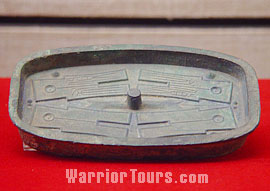Han Dynasty
 The Han Dynasty was a strong country then, one of the four great empires in the world, along with the Kushan Empire (a strong country located in Middle Asia), Arsacid (also named Parthia, a country located on the Plateau of Iran), and the Kingdom of Da Qin (the ancient Rome Empire). Because of the high prestige of the Han Dynasty, foreign countries began to call the Chinese 'Han people', and 'Han' became the general name of the Chinese nation thereafter.
The Han Dynasty was a strong country then, one of the four great empires in the world, along with the Kushan Empire (a strong country located in Middle Asia), Arsacid (also named Parthia, a country located on the Plateau of Iran), and the Kingdom of Da Qin (the ancient Rome Empire). Because of the high prestige of the Han Dynasty, foreign countries began to call the Chinese 'Han people', and 'Han' became the general name of the Chinese nation thereafter.
The Han Dynasty was divided into Western Han (206 BC - 24 AD) and Eastern Han (25 - 220), lasting about more than 400 years in Chinese history.
After the destruction of the Qin Dynasty (221 BC - 206 BC), a war contending for domination over China took place between Xiang Yu, a descendant of the Chu general Xiang Yan, and Liu Bang (Duke of Pei), a local official from 206 BC to 202 BC. In the end, Liu Bang defeated Xiang Yu at Gaixia (near Huaiyang County, Henan Province today), with the help of Xiao He, Han Xin and Zhang Liang.
In 202 BC, Liu Bang established the Han Dynasty, making Chang'an (Chang'an District, Xian today) the capital city. Liu Bang was Emperor Gaozu of the Han Dynasty. After ascending to the throne, Liu Bang took many measures to develop production and to consolidate his reign internally. Experiencing years of wars and chaos, the national power of the newly established Han Dynasty was very weak. So Emperor Gaozu adopted the 'Peace-making Marriage' policy to pacify the invasion of the Huns. In the rule of Liu Che, Emperor Wudi of the Han Dynasty, the politics, economy and military forces became stronger and stronger thanks to the wise emperor. When the Han Dynasty came to its peak, Liu Che appointed the noted general Wei Qing and Huo Qubing to attack the Huns, and got victory in the end. At the same time, Liu Che twice sent Zhang Qian, a famous diplomat in Chinese history, to the Western Regions (middle and west Asia and the Indian peninsula areas today) and developed the Silk Road which connected the East and West in relation to economies and cultures.
However, after Liu Che, most successors were very young or incompetent, so the Han Dynasty gradually declined. In 8 AD, Wang Mang, the younger brother of Empress Wang Zhengjun forced the last emperor of the Dynasty – Liu Ying to abdicate the crown, and then he established the Xin Dynasty.
In 23 AD, Wang Mang's regime was destroyed by the Lulin and Chimei rebels. Later, Liu Xiu, an offspring of the Han royal family, was made emperor by the rebels. Liu Xiu was Emperor Guangwu. He continued to use the name of the Han Dynasty, and made Luoyang the capital. Because Luoyang lies to the east of Chang'an, historians named the former Han Dynasty as the Western Han Dynasty, and the later one as the Eastern Han Dynasty.
Emperor Guangwu abolished Wang Mang's misrules, centralized the power of the central government, and restricted the power of the emperors' relatives on the side of the mothers and wives. Through those measures, his sovereignty was consolidated, and the society was restored to its former calm. Meanwhile dividing the domain into feudal fiefdoms made land annexation a serious matter. As a result, local landowners grew stronger and stronger. Later, China entered another period of political unrest - the Three Kingdoms Period. In 220 AD, Emperor Xiandi of the Eastern Han Dynasty was dethroned by Cao Pi of the Wei State, and the Han Dynasty went to its doom.

